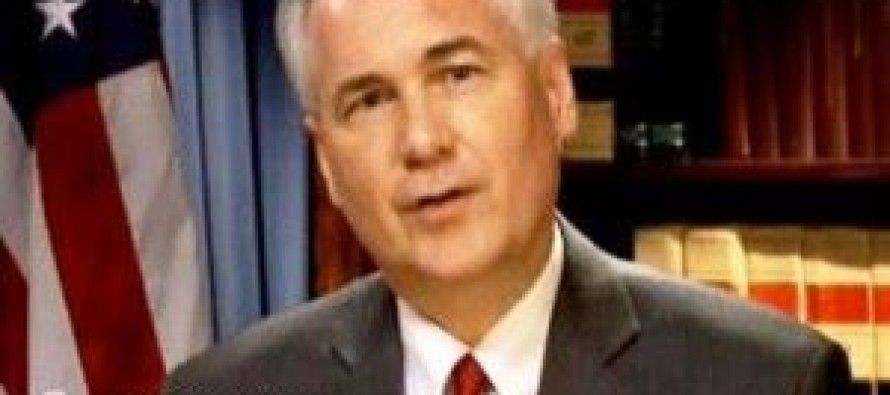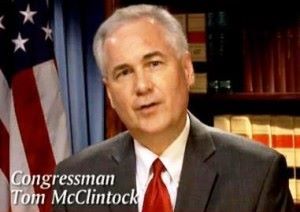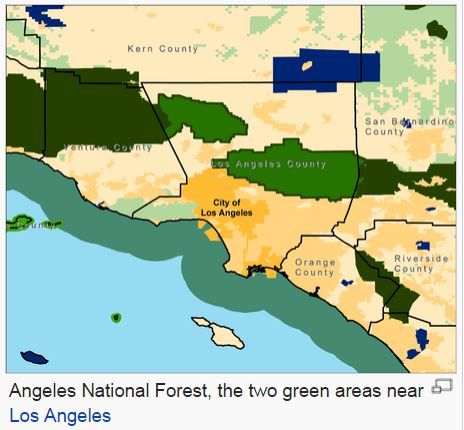McClintock pushes water storage, public lands access

 “I think there’s going to be a concerted effort in the next few weeks to move both short-term and long-term water relief bills for California,” Rep. Tom McClintock, R-Calif., told CalWatchdog.com. As this site reported in November, promising bipartisan efforts by Sen. Dianne Feinstein, D-Calif., to pass a water bill last year fell apart in the end.
“I think there’s going to be a concerted effort in the next few weeks to move both short-term and long-term water relief bills for California,” Rep. Tom McClintock, R-Calif., told CalWatchdog.com. As this site reported in November, promising bipartisan efforts by Sen. Dianne Feinstein, D-Calif., to pass a water bill last year fell apart in the end.
The new makeup of the U.S. Congress might break the log-jam for drought legislation. In addition to Republicans taking over the U.S. Senate and increasing their majority in the U.S. House of Representatives, McClintock just was appointed chairman of the House Subcommittee on Federal Lands of the Natural Resources Committee.
Before being elected to the House in 2008, in his two decades in the California Legislature he continually warned of the need for more water storage.
McClintock said the Feinstein bill only addressed the current drought and didn’t provide long-term relief. Now, he said, “The longer-term measures may take on a more West-wide perspective. So, stay tuned.”
The former chairman of his subcommittee, Rep. Rob Bishop, R-Utah, now chairs the full Natural Resources Committee and is a McClintock ally focused on the water situation in the entire Western United States.
Bipartisan
McClintock pointed out that any bill still must be bipartisan. In the Senate, 60 votes are needed to prevent a filibuster, but Republicans now hold only 54 seats. And 67 votes would be needed to override a potential veto by President Obama.
If a bipartisan bill lands on the president’s desk, McClintock said, “At that point, it’s his prerogative to either sign that legislation into law, or explain to the American people why he is standing in the way of desperately needed water measures.”
As to the GOP takeover of the Senate, McClintock said the president has gotten off to a bad start by “getting Lisa Murkowski mad a him.” From Alaska, she is the new Republican chairwoman of the Senate Energy and Natural Resources Committee.
Reported CNN, “On Sunday, President Barack Obama announced plans for the Interior Department to designate 12 million acres of the Arctic National Wildlife Refuge, including its coastal plains, for conservation. The possibility of such a move has been the cause of a lengthy battle between environmentalists and the energy industry for some time.”
Murkowski branded the move a “stunning attack” on Alaska’s economy. “It’s clear this administration does not care about us, and sees us as nothing but a territory,” she said. The plan must be approved by Congress.
Bonds and dams
Last November, California voters passed Proposition 1. McClintock supported it, writing at the time, “This is a long way from a perfect measure, but it’s as good as it gets in California these days: a $7.5 billion water bond that spends $2.7 billion for new water storage. If that sounds breathtakingly underwhelming, remember that’s $2.7 billion more than the multi-billions of dollars of water bonds that we’ve spent in recent years.”
In the interview, he said he’s been having discussions about how Prop. 1 will interface with federal actions. He’s waiting to see exactly what will be funded by the state measure before working on federal programs.
“Speaking for myself,” he said, “I would like to see streamlined, one-stop permitting for new dam construction. And a prohibition against these massive, pulse-flow releases of water from our dams to adjust the water temperature for the fish, at a time when we’re at a record drought.”
In an article in the Wall Street Journal last March, McClintock described the problem as he saw it:
“Government officials who are entrusted with the careful management of our water squandered it in less than three weeks to nudge baby salmon toward the Pacific Ocean (to which they swim anyway) and to keep the river at just the right temperature for the fish by flushing the colder water stored in the reservoirs.
“These water releases are so enormous they are called ‘pulse flows.’ They generate such swift currents that local officials issue safety advisories to exercise extreme caution when on or near the rivers. While some of the water can be recaptured downstream, most is lost to the ocean.”
In the interview, he summarized, “Generally, droughts are nature’s fault, but water shortages are our fault. We haven’t built a major water storage facility in California since 1979. So we’re not going to solve our water shortage until we build more dams. And we’re not going to build more dams until we overhaul the radical environmental laws that have made their construction impossible.”
 Public lands
Public lands
McClintock also is concerned about what he called maintaining “public access to public lands.” Specifically, he opposes President Obama’s recent unilateral designation of national monuments in California areas formerly more open to the public.
As CalWatchdog.com reported last October, the president came to our state to designate “half of the Angeles National Forest a national monument at the behest of Rep. Judy Chu, D-Monterey Park. … Young people and families use the forest for a cheap recreation place instead driving down to the beach. But environmentalists want forest access limited. The forest attracts 32 million visitors each year, more than Yosemite or Yellowstone national parks.”
McClintock said he takes his philosophy of public lands from Gifford Pinchot, the founder of the National Forest Service. He cited Pinchot’s maxim, “The greatest good for the greatest number in the long run.”
“I think that that maxim is going to apply in the subcommittee to all matters pertaining to public lands. We need to preserve them for future generations. But that doesn’t mean closing them to the current generation,” McClintock said.
This is setting up a clash with the president and some of the more ardent environmentalists. McClintock said the president is claiming his authority to designate national monuments from the Antiquities Act of 1906.
This is confirmed by the White House website, which claimed, “First exercised by President Theodore Roosevelt in 1906 to designate Devils Tower National Monument in Wyoming, the authority of the Antiquities Act has been used by 16 presidents since 1906 to protect unique natural and historic features in America, such as the Grand Canyon, the Statue of Liberty and Colorado’s Canyons of the Ancients.”
But according to McClintock, the 1906 act was “an emergency power to protect small archaeological sites from looting. It’s been used over the years to the point that this president is attempting to use it to place millions of acres off limits for virtually any human activity.”
The actual wording of the act, 16 USC 431-433, reads:
“That any person who shall appropriate, excavate, injure, or destroy any historic or prehistoric ruin or monument, or any object of antiquity, situated on lands owned or controlled by the Government of the United States, without the permission of the Secretary of the Department of the Government having jurisdiction over the lands on which said antiquities are situated, shall, upon conviction, be fined in a sum of not more than five hundred dollars or be imprisoned for a period of not more than ninety days, or shall suffer both fine and imprisonment, in the discretion of the court.
“Sec. 2. That the President of the United States is hereby authorized, in his discretion, to declare by public proclamation historic landmarks, historic and prehistoric structures, and other objects of historic or scientific interest that are situated upon the lands owned or controlled by the Government of the United States to be national monuments.”
Jobs
McClintock also is concerned about the jobs of the Californians who work in or near the areas that could be restricted. Despite an improving jobs picture, California’s unemployment rate remains higher than the national average. He pointed to the Lake Berryessa Chamber of Commerce’s opposition to its area being designated a national monument, something sought by environmentalist groups.
The chamber itself explained on its website:
“At its regular monthly meeting on January 12, 2015, the Board of Directors of the Lake Berryessa Chamber of Commerce voted to oppose the creation of a so-called Berryessa Snow Mountain National Monument (BSMNM). The Board’s primary concern was the potential negative impact of the designation on Lake Berryessa and its business and residential communities.”
McClintock maintained that environmental concerns and public access to public lands both can be met. “So the people are speaking very loudly and clearly,” he said. “Their president, unfortunately, at the moment isn’t listening. Congress, however, is.”
Related Articles
State’s most sickening building
JUNE 22, 2010 By KATY GRIMES The Board of Equalization employees are sick of work. Actually, they are sick because
Covered California extends signup deadline after long waits, call surge
A surge of last-minute callers inundated the state’s health insurance exchange for the federal Patient Protection and Affordable Care Act,
How new CA voter demographic milestone will affect upcoming elections
As early ballots arrive in mailboxes this week, Golden State voters will arrive at a symbolic and substantial demographic landmark: a so-called majority-minority electorate. “For the




